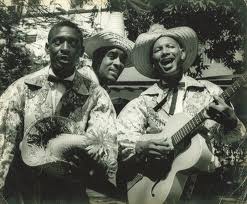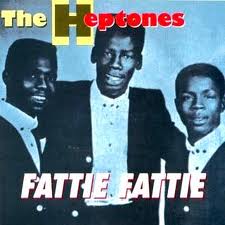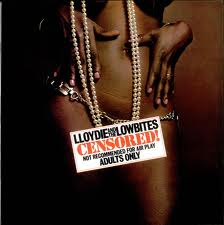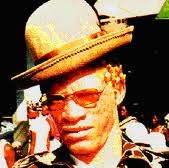
Mento kickstarts lewd lyrics in popular music
Jamaica has a long tradition of recordings with suggestive lyrics. Referred to as slackness by ordinary street people and churchgoers, it holds an almost honoured place in the hearts of Jamaican music lovers, stretching way back to the mento era of the 1950s. One musicologist even went as far as to remark that suggestive lyrics go a far way towards enhancing the sales and popularity of many Jamaican recordings.
This is an undeniable fact based on the historical data associated with such recordings.
The late Alerth Bedasse, one of the main exponents of mento and lead vocalist of the very popular mento aggregation of the 1950s – The Chin’s Calypso Sextet, spoke about suggestive lyrics.
During an interview I had with him, where I asked why it was that mento songs with suggestive lyrics sold so much and were so popular, he responded by saying; “It’s the first time they are getting a rhythm like that and it was a little suggestive, and you know Jamaicans just love that type of thing”.
It was during the mento era that sexually suggestive songs became popular. That trend has continued to this very day.
Trinidadian calypso, considered mento’s cousin, bears some resemblance in this respect, but mento with its humour, subtle ambiguity and euphemisms, along with its background in Jamaica’s slave plantation system, made it most attractive to Jamaicans.
Bedasse, however, downplayed the interest in slackness associated with mento when he remarked, “If one were to compare Mento’s alleged slackness with what’s happening in the dancehalls these days, then Mento could probably be played in a church”.

The Chins Calypso Sextet’s recording of Night Food was the first recording to create a public stir when it was released on a 78RPM vinyl record between 1952 and 1953.
Risky investment
According to Bedasse, who I interviewed in 2005, he encountered insurmountable difficulties in obtaining a sponsor/producer, or what they referred to in those days as ‘someone to buy the song’.
No one, including Ken Khouri of Federal Records, or Ivan Chin of Chin’s Radio Service, were willing to take the risk of investing in a recording that had suggestive lyrics such as:
“This food needs no knife and fork,
how can any human be so dark.
The food is right here in the bed,
come here man make me scratch your head.”
It was written by one of the most humorous and skilful songwriters of the 20th century, Everald F Williams, a schoolteacher of great repute, born in Salem St Ann.
He wrote almost all of Bedasse’s hits with the Chin’s Sextet, and a large percentage of the hits from other mento singers including Count Lasher of The Talking Parrot fame.
According to Bedasse, a very brave man named Sanford who had a small electronic shop along Church Street in Kingston, took the risk and bought Night Food for 18 Pounds and he never regretted it.
The recording sold so much, Sanford was unable to fill all the orders. He made so much money, he quietly disappeared from the scene and was never seen again. Ken Khouri, who did the pressing for the Stanley Motta’s recording of Night Food, stated in a television interview, just before his passing, that no record in Jamaica’s music history has ever sold as quickly as Night Food, while Bedasse stated that the income generated from it, helped in building Khouri’s 220 Marcus Garvey Drive establishment.
The follow-up Night Food Recipe was just as popular. The success of these recordings underlines, even from those early days, the intense passion Jamaicans have for songs with suggestive lyrics.
The repercussions of these songs’ lyrics took on alarming proportions when The Honourable Wills O. Isaacs, minister of trade and industry in the then ruling People’s National Party Government, held aloft a copy ofThe STAR of April 2, 1956, declaring “Imagine things like these being played to our children”. Bedasse was firm in his defence “Is it the calypsos that are really vulgar or is something wrong with the minds of the complainants; for example, what is night food? What is forbidden fruit? Can anyone give the right meaning?”
The combination of Williams and Bedasse fronting the Chin’s Calypso Sextet, had several other recordings with ambiguously suggestive lyrics.
Big Boy And Teacher had big boy asking teacher:
What is catty?
Is catty high is catty low?
will catty stand up to any blow?
is catty deep is catty wide?
is catty something that I can ride? –
only to realise in the end that:
Catty refers to a cat
that is sleeping on the mat.
Other Chin’s Sextet recordings like Red Tomato, Rough Rider,Depression and others continued the trend of sexually suggestiveness in their lyrics, while Count Lasher joined the fray with Miss Constanceand Water The Garden in which he boasted:
You should see how I pose
when I reel out my hose
and water the garden.
As the years progressed, the lyrics became less ambiguous and more explicit with albums like Censored which was a massive seller.
The Heptones’ Fatty Fatty, and Nora Dean’s Barbed Wire were all big sellers in the 1960s as the trend shows that some of the biggest sellers in the history of Jamaican music have been big on ‘slackness’.
The Lloyd Charmers produced album Censored by Lloydie and the Lowbites sold so well, it triggered two further volumes.
The phenomenon intensified as the dancehall era emerged with dancehall legend Admiral Bailey leading the way, while Lecturer matched him.
Yellowman too, ruled the 1980s with several that had his fans crowning him dancehall king. At the turn of the decade, the trend slowed somewhat, but again picked up in 1993 with Lady Saw and others. Although being banned by some music bodies, Lady Saw continued to have sell-out audiences and good record sales. Although met with resistance from the authorities, the trend of producing slackness continues.

broyal_2008@yahoo.com





You must log in to post a comment.